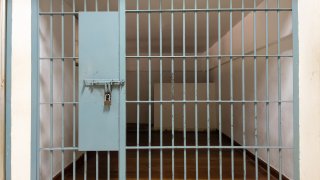
We're taking an in-depth look at our state's prison system and how a new bill could change solitary confinement policies.
Solitary confinement policies are one contributing factor to the mental health challenges of the incarcerated population, according to Barbara Fair, who is a member of Stop Solitary CT. Stop Solitary CT is a group that is centered around stopping the use of solitary confinement in prisons.
Recently, there was an agreement with the Department of Correction on language for a new bill that would limit the use of solitary confinement and increase oversight.
NBC Connecticut's Mike Hydeck spoke with Fair about what the bill could change.
Get Connecticut local news, weather forecasts and entertainment stories to your inbox. Sign up for NBC Connecticut newsletters.
Mike Hydeck: "So it seems back in 2021, legislation was on track to at least limit the use of solitary confinement in Connecticut's prisons, but Governor Lamont vetoed it. Why do you think he did that?"
Barbara Fair: "Well, he, I think, primarily was because of the pushback from the unions who gave the stories of, you know, not enough staff, and it's going to be dangerous to let people out. And so the governor, I think, listened to that more than he listened to the voices of all the other people that were saying it was time to do something differently."
Mike Hydeck: "So now after that, he issued some executive orders to try to at least limit the use of solitary confinement. Was that effective in your estimation?"
Face the Facts
Face the Facts with NBC Connecticut goes beyond the headlines, asking newsmakers the tough questions, giving an in-depth analysis of the big stories.
Barbara Fair: "Well, hearing from the voices of the people, because we receive letters all the time, that it actually didn't make things better. It actually made things worse. And so that oversight, and I think that was the main thing that was missing from this legislation... that this executive order, is that without oversight, it's hard to tell what's actually going on."
Mike Hydeck: "So now, as we've learned, there's another piece of legislation on the table. Do you think that that has any better chance of succeeding this time around?"
Barbara Fair: "I think it has a much better chance of succeeding only because this year, we had a new strategy. It was reaching out to all the stakeholders, to incarcerated people, the families of incarcerated people, union presidents, the governor's office, and I worked on a weekly basis with Department of Correction. And so I think that all of us came together pretty much and came up with a different piece of legislation that took into account that we have to do something better than what we've been doing. But we have to do it in a more gradual basis for the safety. And we heard those voices of the safety for both correctional officers and also any correctional staff as well as incarcerated people."
Mike Hydeck: "Because I know the correction staff had a concern about solitary confinement going away because more than 100 or 150 prison staff were injured in things that happened within the jail walls. Can you talk about your conversation or your negotiations with the DOC Commissioner? What were they like? And what were his biggest concerns when you talked with him?"
Barbara Fair: "I have to tell you, it was very tenuous in the beginning. We were like worlds apart, but through weeks of talking with the commissioner and the administrative staff, we got closer and closer to hearing each other and understanding the, you know, the commissioner's concerns, and he also understanding our concerns. And that's how we grew closer and closer to coming to an agreement that we were at least going to start the process. Because we both agree there's a lot of work to be done in Connecticut, but we can at least make this first step and come together and this time having oversight as mandate. We can't do this without oversight."
Mike Hydeck: "Now recently, prisoners from solitary confinement testified in front of the Judiciary Committee alleging abuse, alleging using food as a weapon or some kind of punishment. What are some of the things you learned from talking to them, reading their letters and the testimony that happened recently?"
Barbara Fair: "I've learned so much. For example, we have to start with oversight. We have to start looking at how relevant are these charges that incarcerated people are getting. Like one young man said, they went on a hunger strike and got signatures from other people inside, too. Let's work on how we can change some of these conditions. And he was given a ticket for inciting a riot and spent 20 days in solitary. Those are the kind of things that oversights going to have to start looking at --- the relevance of these tickets that people are getting to be held in solitary and for so long. But without oversight, these kinds of things can happen. And so you have to understand this is a system that has been closed to public scrutiny for decades. And so you're going to get a lot of pushback when you start demanding that they start opening up the system so that we know what's actually going on inside."
Mike Hydeck: "So speaking of pushback, to play devil's advocate here, have you gotten pushback from any family just saying, 'look, that person who is incarcerated killed one of my family members, my daughter, my mother, why should I care about their rights once they're inside the prison?' Have you ever heard that side of the story?"
Barbara Fair: "I haven't heard it, but what I have heard watching the committee vote last year, is that one of the legislators brought up a story of the horrible incident that happened in Cheshire with the Pettit family, and talked about these, you know, these are the people we need to be concerned about and instead of coddling the prisoners. And then what we found was the two men who are responsible for this horrific act, neither one are facing these conditions in Connecticut. Both are in medium security prisons in Pennsylvania. So those are the only stories that I've heard where, you know, people have pushed back, but that was a false narrative because these guys are not even in Connecticut. The majority of people in Connecticut serving time in isolation is over 60, no sorry, it's higher than that. Over 90% are people, African American and Latino young men."
Mike Hydeck: "We'll definitely keep an eye on this story."



